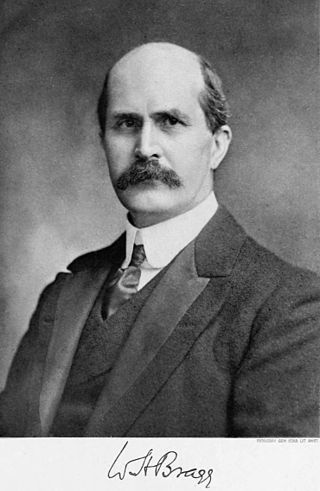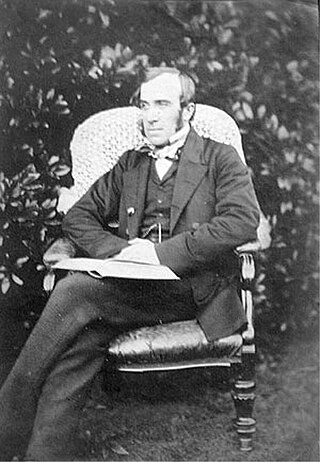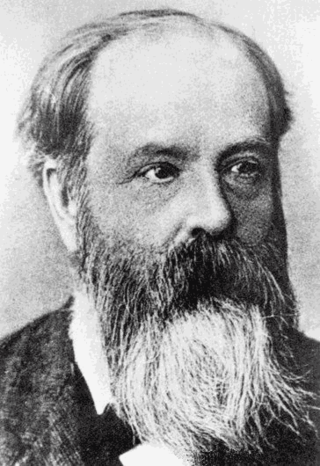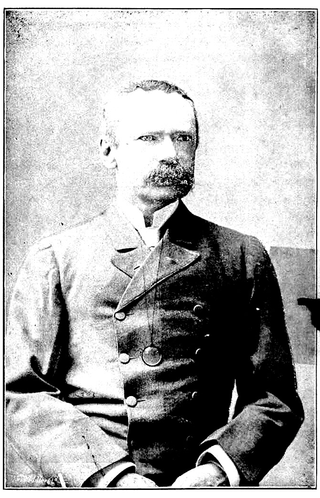Quain Professor is the professorship title for certain disciplines at University College London, England. The title honours Richard Quain, who became Professor of Anatomy in 1832 at what would become University College, London. Quain left a legacy to the university to endow professorships in four subjects in 1887. [1] He intended that the funding should recognise his brother, John Richard Quain, as well as himself.
The Burhop prize for Physics, Applied Physics or Mathematics/Physics is also drawn from these funds. [2]
The Quain professorships cover Botany, English language and literature, Jurisprudence, and Physics.

Sir John Ambrose Fleming FRS was an English electrical engineer and physicist who invented the first thermionic valve or vacuum tube, designed the radio transmitter with which the first transatlantic radio transmission was made, and also established the right-hand rule used in physics.

Sir William Henry Bragg was an English physicist, chemist, mathematician, and active sportsman who uniquely shared a Nobel Prize with his son Lawrence Bragg – the 1915 Nobel Prize in Physics: "for their services in the analysis of crystal structure by means of X-rays". The mineral Braggite is named after him and his son. He was knighted in 1920.

Sir Monier Monier-Williams was a British scholar who was the second Boden Professor of Sanskrit at Oxford University, England. He studied, documented and taught Asian languages, especially Sanskrit, Persian and Hindustani.

Lancing College is a public school for pupils aged 13–18 in southern England, UK. The school is located in West Sussex, east of Worthing near the village of Lancing, on the south coast of England. Lancing was founded in 1848 by Nathaniel Woodard and educates c. 600 pupils between the ages of 13 and 18; the co-educational ratio is c. 60:40 boys to girls. Girls were admitted beginning in 1971. The first co-ed, Saints’ House, was established in September 2018, bringing the total number of Houses to 10. There are 5 male houses and 4 female houses.
Edward Neville da Costa Andrade FRS was an English physicist, writer, and poet. He told The Literary Digest his name was pronounced "as written, i.e., like air raid, with and substituted for air." In the scientific world Andrade is best known for work that first determined the wavelength of a type of gamma radiation, proving it was far higher in energies than X-rays known at the time. Also, a rheological model suggested by him and bearing his name is still widely employed in continuum mechanics and its geophysical applications. In popular culture he was best known for his appearances on The Brains Trust.

The Physical Society of London, England, was a scientific society which was founded in 1874. In 1921, it was renamed the Physical Society, and in 1960 it merged with the Institute of Physics (IOP), the combined organisation eventually adopting the name of the latter society.

Arthur Anthony Macdonell, FBA was a Sanskrit scholar.

Sir Harrie Stewart Wilson Massey was an Australian mathematical physicist who worked primarily in the fields of atomic and atmospheric physics.
Albert Hugh Smith OBE was a scholar of Old English and Scandinavian languages and played a major part in the study and publication of English place-names.

The position of Boden Professor of Sanskrit at the University of Oxford was established in 1832 with money bequeathed to the university by Lieutenant Colonel Joseph Boden, a retired soldier in the service of the East India Company. He wished the university to establish a Sanskrit professorship to assist in the conversion of the people of British India to Christianity, and his bequest was also used to fund scholarships in Sanskrit at Oxford. The first two professors were elected by Oxford graduates, as the university's statutes provided: Horace Hayman Wilson won by a narrow majority in 1832, and the 1860 election was hotly contested, as the rivals each claimed to be best at fulfilling Boden's intentions and presented different views about the nature and purpose of Sanskrit scholarship. Reforms of Oxford implemented in 1882 removed all mention of Boden's original purpose from the statutes, removed the power to elect the professor from graduates, and gave the holder of the professorship a fellowship at Balliol College, Oxford.

The Royal Naval College, Greenwich, was a Royal Navy training establishment between 1873 and 1998, providing courses for naval officers. It was the home of the Royal Navy's staff college, which provided advanced training for officers. The equivalent in the British Army was the Staff College, Camberley, and the equivalent in the Royal Air Force was the RAF Staff College, Bracknell.

Erasmus Smith's Professor of Natural and Experimental Philosophy at Trinity College Dublin is a chair in physics founded in 1724 and funded by the Erasmus Smith Trust, which was established by Erasmus Smith, a wealthy London merchant, who lived from 1611 to 1691. It is one of the oldest dedicated chairs of physics in Britain and Ireland. Originally, the holder was to be elected from the members of the college by an examination to determine the person best qualified for the professorship. Since 1851, the professorship has been supported by Trinity College. Of the 22 holders of this chair, seven were Fellows of the Royal Society while one, Ernest Walton, won the Nobel Prize for Physics.

The Eldon Law Scholarship is a scholarship awarded to students from the University of Oxford who wish to study for the English Bar. Applicants must either have obtained a first class honours degree in the Final Honours School, or obtained a distinction on the BCL or MJur. It is a two-year scholarship presently funded at £9,000 a year.
The Jodrell Chair of Physiology is a chair at University College London, endowed by Thomas Jodrell Phillips Jodrell in 1873. The chairs succeeded the previous chair in Anatomy and Physiology.
This page is based on this
Wikipedia article Text is available under the
CC BY-SA 4.0 license; additional terms may apply.
Images, videos and audio are available under their respective licenses.









